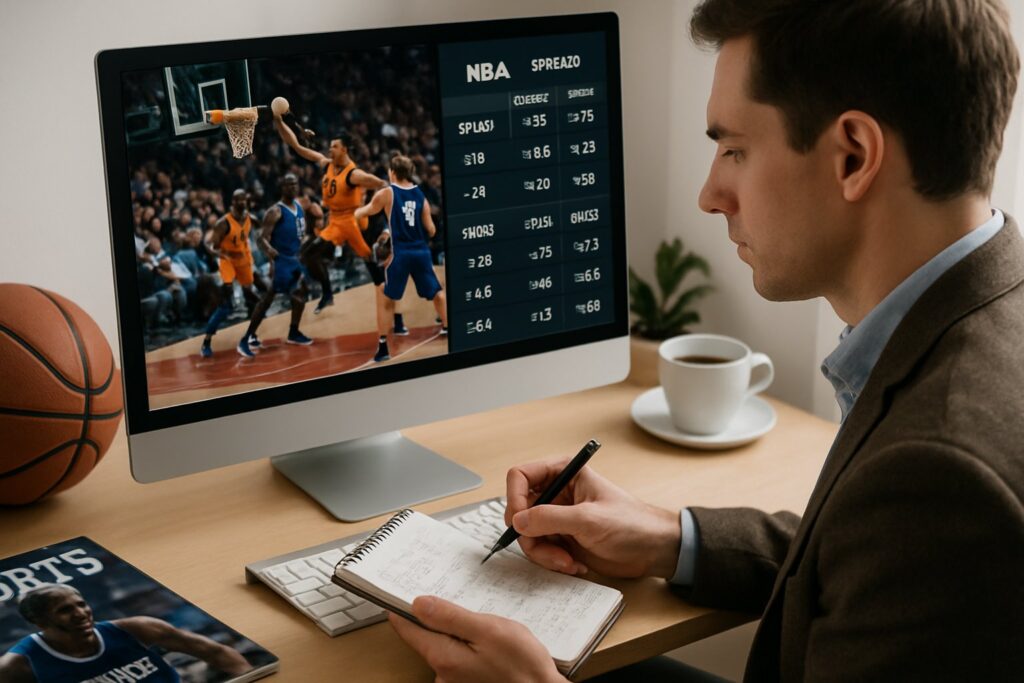by Martin Green
August 9, 2025
Last Updated on August 9, 2025 by Martin Green
Betting on the NBA isn’t rocket science once you get the hang of the basics. You’ve got point spreads, moneylines, and totals – each one with its own quirks. To bet on the NBA, pick a betting market, understand the odds, and place your wager through a legal sportsbook.

Live betting is another option, with odds that keep shifting as the game unfolds. If you’re sharp enough to spot good lines, it can be a goldmine. Don’t overlook your sportsbook, either – odds, promos, and features can be surprisingly different from one platform to the next.
If you actually want to make smart bets, you’ll need some strategy. Get to know how spreads work, keep an eye on team trends, and don’t let your bankroll run wild.

NBA betting means putting money on specific outcomes in pro basketball games. You can bet on who’ll win, by how much, or on player and team stats. Sportsbooks set odds and lines, which tell you what you can win and what you need to risk.
An NBA wager is just a bet on something basketball-related. It could be a single game, a player’s stats, or even a season-long accomplishment.
When you bet, you decide how much to risk based on the odds the sportsbook gives you. If you’re right, you get paid out according to those odds.
You can lock in your bets before a game or jump in during live play. Pre-game bets freeze the odds at the moment you place them, while live betting odds move around as the action unfolds.
Popular bets include picking the winner, guessing the total points, or betting on whether a player will beat a certain stat line.
A betting line shows the odds for a bet. It spells out how much you stand to win and what you need to risk.
Most of the time, you’ll see American odds – those plus (+) and minus (-) numbers.
Example:
| Team | Line | Meaning |
|---|---|---|
| Lakers | -200 | Bet $200 to win $100 if they win |
| Bulls | +170 | Bet $100 to win $170 if they win |
Sportsbooks move the lines around based on injuries, recent form, and how people are betting. If you pay attention to those shifts, you might spot some value.
You’ve got a few main types to pick from:
Each one comes with its own risks and rewards. Moneylines are simple, but props and spreads need a bit more homework. Futures can pay big if you’re patient, but you’ll be waiting a while to see how it shakes out.

Point spreads are probably the most popular way to bet on NBA games. They balance out the matchup so you’re not just picking the better team every time.
Sportsbooks set a point spread by guessing how much the favorite will win by. They look at team strength, injuries, who’s at home, and recent results.
Let’s say the Lakers are -5.5. The book figures they’re 5.5 points better than their opponent. If you bet the Lakers, they have to win by 6 or more for you to cash in.
Spreads can shift if a lot of people pile onto one side, or if there’s breaking news about injuries. That’s called line movement, and sometimes it happens fast.
Main things that move spreads:
Point spreads always show a favorite (minus) and an underdog (plus).
Example:
| Team | Spread |
|---|---|
| Boston Celtics | +3.5 |
| Miami Heat | -3.5 |
If you pick the Heat at -3.5, they need to win by 4 or more. If you go with the Celtics at +3.5, they can win or lose by up to 3 and you’re good.
You’ll also see odds next to the spread, like -110. That means you bet $110 to win $100. If it’s +110, you’d win $110 on a $100 bet.
Some folks think the spread predicts the exact margin. It really just helps books get even action on both sides.
Don’t assume the favorite always covers. They might win but not by enough points.
Line movement doesn’t always mean someone knows a secret. Sometimes it’s just a lot of public money coming in on one side.
Spreads don’t stay put, either. They can change several times before the game, so picking your moment matters.
You want a sportsbook that’s legal where you live, has fair odds, and pays out reliably. This choice can really affect what you get from every bet and how easy it is to manage your action.
Online sportsbooks make it easy to check lines, bet live, and grab bonuses right from your phone or laptop. You can compare odds on a bunch of games in just a few clicks.
Vegas sportsbooks give you that in-person vibe, with paper tickets and cash payouts on the spot. Sometimes their lines are a little different, especially for local teams or big events.
When you’re sizing up sportsbooks, look at:
If you can, open accounts at a couple of books. That way, you can shop for the best odds and snag more promos.
Sportsbooks set odds based on what they expect to happen and how people are betting. A line shows the spread, moneyline, or total for a game, plus what you’ll pay to bet it.
For example:
| Team | Moneyline | Spread | Total |
|---|---|---|---|
| Celtics | -175 | -3.5 (-110) | O 225.5 (-110) |
| Knicks | +145 | +3.5 (-110) | U 225.5 (-110) |
Negative odds (-175) mean you risk $175 to win $100. Positive odds (+145) mean you win $145 if you bet $100.
Lines move when injuries pop up, teams make news, or the public piles in one direction. If you track line movement, you might find a good time to place your bet.
NBA games offer all kinds of bets. Some are simple, like just picking who wins. Others get into predicting totals or even season-long outcomes. If you know your options, it’s a lot easier to find bets that actually match your style and appetite for risk.
Moneyline bets are as straightforward as it gets. You pick who you think wins, and the odds decide your payout.
Favorites have negative odds (like -150), so you need to risk more to win $100. Underdogs come with positive odds (like +130), so a $100 bet pays out more if they pull off the win.
Moneylines are great if you’re confident a team will win, no matter the margin. They’re common in tight matchups or when the spread feels iffy.
Don’t forget to compare odds across books. Even a small difference, like -140 vs. -135, adds up over time.
Totals, or over/under bets, are about the combined score. The sportsbook sets a number, and you pick if the real total will be higher or lower.
Say the total is 224.5 points:
Pace, shooting, and defense all play into where the total lands. Injuries to scorers or defenders can move that number, too.
Keep an eye on how teams have been doing against the total lately. Some squads just play faster or slower, which can tip you off to a good spot.
Futures bets let you predict things that won’t be decided until later in the season. Think of picking the NBA Championship winner, the MVP, or conference champions.
During the playoffs, series bets get a lot of attention. Here, you’re betting on which team takes a best-of-seven series, not just one game.
These bets can pay out nicely, but there’s a lot of unpredictability. Injuries, trades, or teams suddenly getting hot or cold can really shake things up.
When you place a futures bet matters. If you bet before the season starts, you’ll usually get better odds. Wait longer, and you might have more info – but the odds drop.
Spotting small edges often makes the difference in NBA betting. If you pay attention to how the market moves, dig into performance data, and watch your bankroll, you’ll put yourself in a better spot.
NBA lines move fast, especially with injury news, lineup changes, or heavy public action. If you keep an eye on opening lines and compare them to current odds, you’ll start to see where things are trending.
If you’re pretty sure a key player will sit, betting early can get you better odds. But if you think the public is pushing the line too far, waiting might give you value on the other side.
Key factors that move lines:
Check multiple sportsbooks before you lock in a bet. Even a half-point difference on the spread can add up over time.
Don’t just look at win-loss records when sizing up NBA teams. Dig into offensive and defensive ratings, pace, and recent form. How a team plays can matter as much as who they play, especially for totals.
Player analysis matters, too. Watch how key guys perform on the road, after some rest, or against certain defenses.
Some numbers to keep in mind:
Matchups can swing things. A tough perimeter defense might shut down a big-time shooter, while a strong center could have a field day against weak inside defenders.
Having a solid bankroll plan keeps you from blowing up after a bad streak. Pick a fixed percentage to risk per bet – usually 1% to 3%. Don’t start betting bigger just because you’re down. That’s a quick way out.
Keep track of your bets in a spreadsheet or app. Jot down the date, game, bet type, odds, and result. It’ll help you figure out what’s working and what isn’t.
Stick with your staking plan, even if you’re on a heater. Consistency is what gets you through a long NBA season.
Winning at NBA betting really comes down to how well you prep and how steady you stay once the games tip off. If you use solid info, track trends, and avoid mistakes that kill value, you’ll give yourself a fighting chance.
Before you bet, check out how teams have played lately. Look at win-loss records, point differentials, and home vs. away results from the last 5-10 games.
See how teams match up head-to-head. Sometimes, a squad just has another team’s number, no matter what the standings say.
Injuries and roster tweaks can flip a game on its head. A starter out or a bench guy back can change the pace, scoring, and matchups.
Schedules matter, too. Teams on the second night of a back-to-back usually shoot worse and play slower. Long road trips can leave players gassed.
Stick with trustworthy stats sites like the NBA’s official page or solid betting analytics sources. You’ll spot trends you’d miss just looking at the standings.
Don’t let loyalty get in the way. Betting on your favorite team is a bad idea unless you can stay objective.
Chasing losses by upping your bet size is a trap. It’ll drain your bankroll fast. Instead, keep your stake steady – usually 1-5% of your bankroll per bet.
Be careful with big favorites on the moneyline. The reward often doesn’t match the risk, especially since underdogs win more than you’d think.
Don’t ignore line movement. Big shifts in spreads or totals usually mean something – maybe injury news or sharp money moving in.
If you don’t fully get how a bet works, hold off. Learn the ropes before you risk your cash.
NBA betting means knowing the different types of bets, how odds work, and what can swing a game. If you get the rules, legal stuff, and how to read team and player info, you’ll make smarter calls.
You can bet the moneyline and just pick a winner.
Point spread bets factor in the margin of victory. Totals (over/under) are all about the combined score.
There’s also prop bets, futures, parlays, teasers, and live in-game bets.
Odds show you the implied chance of something happening and what you’ll win if you’re right.
If you see a negative number (like -150), that’s how much you have to bet to win $100. A positive number (like +200) means you win that amount for every $100 you bet.
Odds formats change from book to book, but the basics don’t.
Look at recent team form, not just the full-season record.
Pay attention to head-to-heads, playing styles, and where teams are strong or weak statistically.
Watch injury reports, schedule quirks, and travel – all of that can impact how players show up.
Sports betting laws depend on where you live.
Check if NBA betting is legal in your area and stick to licensed sportsbooks.
Some places ban certain bets or have age limits, so always double-check the rules before you play.
The point spread levels the playing field between teams.
If you pick the favorite, they need to win by more than the spread. If you take the underdog, they can lose by less than the spread or win outright.
If the final score matches the spread exactly, it’s a push and you get your money back.
When a star player gets hurt, the betting lines usually shift a lot.
Even if a role player is out, it can shake up rotations and change how teams match up or score.
If you check the injury reports before betting, you might dodge some nasty surprises – or maybe even find some sneaky value in the changing odds.